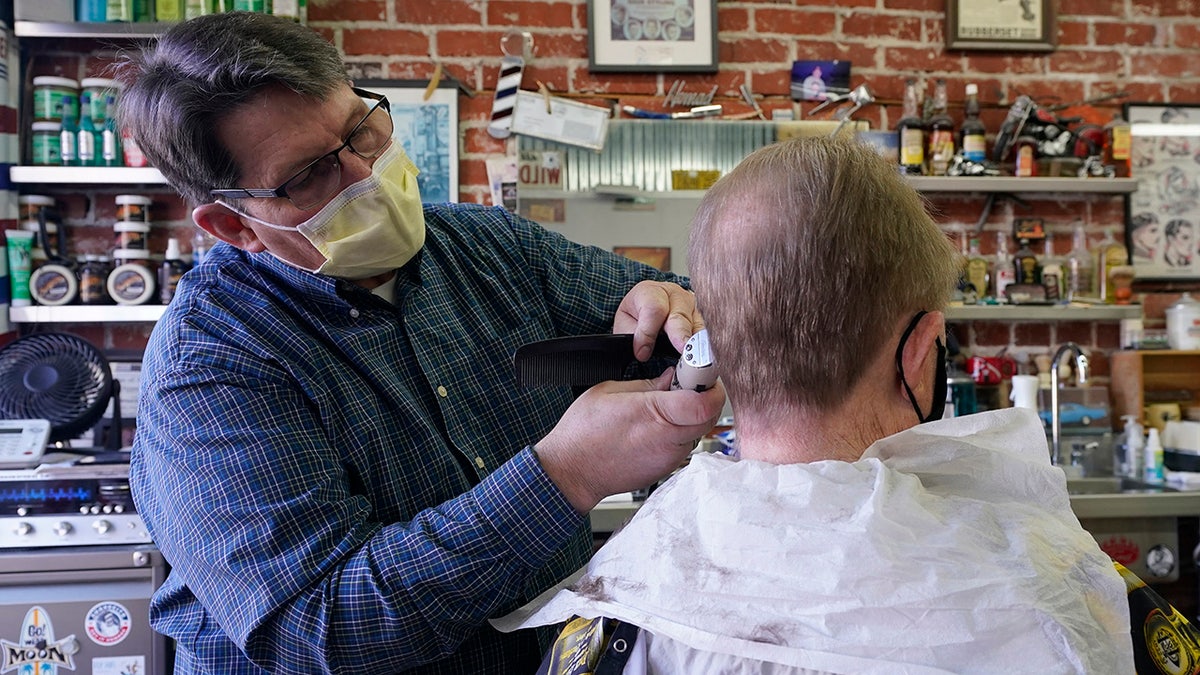Media top headlines February 2
In media news today, Whoopi Goldberg gets suspended from ‘The View’ following remarks on the Holocaust, a Washington Post reporter compares COVID-19 deaths to murder victims, and Fox News becomes the first cable news network to finish No. 1 for 20 straight years.
Dr. Eran Bendavid, associate professor of medicine at Stanford University, is making the case that continued masking and social distancing as measures to fight the coronavirus pandemic are actually doing long-term damage to our immune systems.
In a Tuesday op-ed for The Wall Street Journal, Bendavid argued that the policies put in place to prevent the spread of the coronavirus needed to be re-evaluated because they were reducing people's exposure to microbes, therefore preventing the immune system from training well against other diseases.
TUCKER CARLSON SLAMS COVID ‘NUTCASE FROM BAYLOR’ PETER HOTEZ FOR ‘DISCREDITING AMERICAN MEDICINE’
"Maintaining good health is often a balancing act. Too much food and we develop obesity, diabetes and heart disease. Too little food and we see stunting and wasting," Bendavid wrote. "This kind of equilibrium applies to our interactions with bacteria, viruses, parasites and other microbes. Too much exposure to some microbes leads to disease, and so does too little."
"The intensification of hygienic policies with the advent of Covid-19 was understandable. But long-term masking, deep cleaning, distancing and isolation can be harmful to health, especially for children, precisely because it reduces exposure to microbes. Hygiene practices have health risks as well as benefits," he added.
Bendavid wrote that one of civilization's greatest accomplishments was the "great escape" from infectious disease, in that diseases like tuberculosis, typhoid fever, polio and smallpox were tamed by clean drinking water, vaccinations, antibiotics and sanitation. Despite this, he noted, antiseptic populations were seeing increasing levels of asthma, allergies, Type 1 diabetes, Crohn’s disease and other diseases with a significant autoimmune component.

Miami Beach, Teens in face masks shopping at Publix, grocery store. (Photo by: Jeffrey Greenberg/Education Images/Universal Images Group via Getty Images) (Jeffrey Greenberg/Education Images/Universal Images Group via Getty Images)
"Animal studies, laboratory experiments and small trials in humans all point in a similar direction: Avoiding exposure to some microbes prevents the immune system from training well and predisposes to autoimmune diseases," Bendavid wrote.
"The risk of untoward consequences from excessive hygiene is particularly striking for children. The immune system gets the most effective tuning during childhood, and reducing its ability to distinguish disease-causing invaders from benign targets is a common mechanism proposed for allergies, asthma and immune-mediated bowel diseases, among others," he added.

Mike Douglass, left, gives Kent Kjestrom a haircut at East J Barbers in Sacramento, Calif., Thursday, Jan. 21, 2021. (AP Photo/Rich Pedroncelli) ((AP Photo/Rich Pedroncelli))
WASHINGTON POST REPORTER COMPARES COVID-19 DEATHS TO MURDER VICTIMS, MOCKS CALLS TO ‘MOVE ON’
Bendavid argued that current hygiene policies and practices needed to be rebalanced, especially when it came to pracitives of deep-cleaning and contact restriction.
"The evidence that masking reduces spread is stronger, but it also limits the exchange of other microbes, which may be deleterious, especially to children," he wrote.

FILE PHOTO: A child wears a face mask on the first day of New York City schools, amid the coronavirus disease (COVID-19) pandemic in Brooklyn, New York, U.S. September 13, 2021. REUTERS/Brendan McDermid/File Photo (REUTERS/Brendan McDermid/File Photo)
He explained that it was too early to see rises in autoimmune disorders due to the changes, but that school and daycare COVID policies would ultimately mean more harm being done to children.
"The extreme concern for hygiene at the onset of Covid-19 was intuitive and understandable," Bendavid wrote. "But policies that were easy to support two years ago need re-evaluation. Distancing, deep-cleaning and masking aren’t 'more is better' kinds of goods."










































